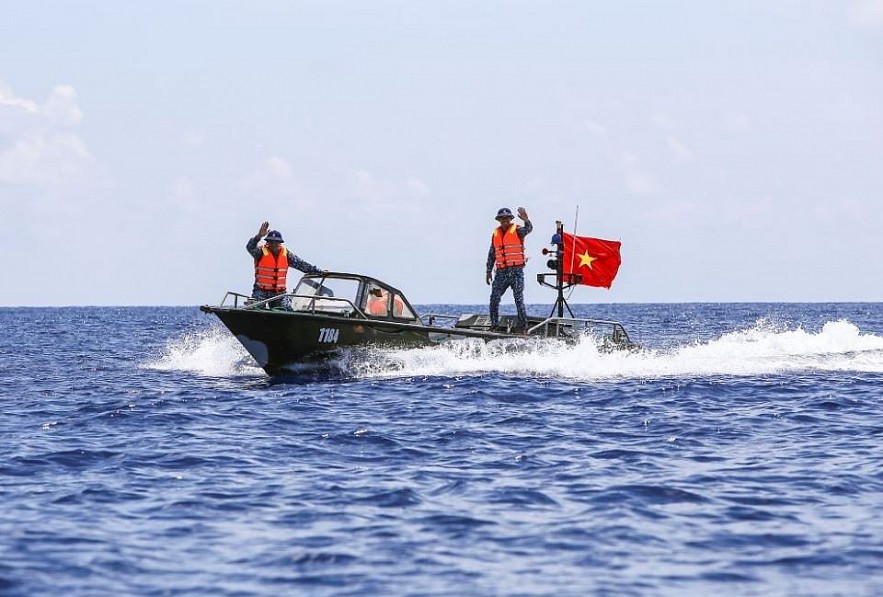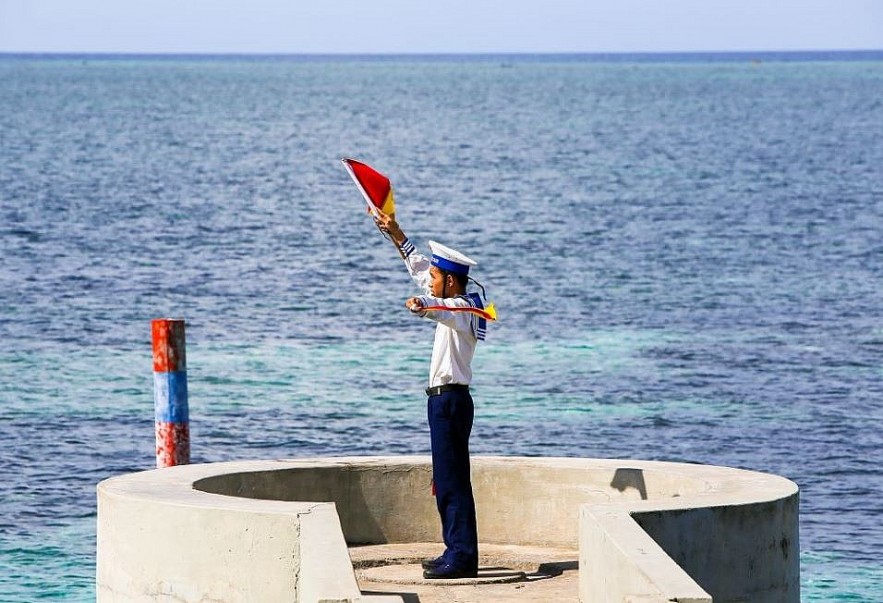Upholding Rule of Law: Necessary Measure to Solve South China Sea Issue
 |
| Photo: Baoquocte |
On July 12, 2016, the Permanent Court of Arbitration (PCA) in The Hague (Netherlands) ruled that China’s claims of historic rights within its so-called “nine-dash line”, which covers more than 80% of the South China Sea, are completely baseless and illegitimate according to the 1982 UNCLOS.
The ruling also marks an important milestone to solve the South China Sea issue by peaceful means, and simultaneously affirms the paramount role of international law in dispute settlement.
The international community lauded the PCA’s ruling. 40 countries have been reported to announce their support for the arbitration publicly.
Then-United Nations Secretary-General Ban Ki-moon urged all parties to resolve their disputes in the South China Sea in a peaceful and amicable manner, through dialogue and in conformity with international law.
The US stated that the PCA’s ruling was “an important contribution to the common goal of peaceful resolution” of the disputed issues in the South China Sea.
The European Council (EC) called on China to respect the international system, stressing that a “rules-based international order” would serve common interests and need protection.
Years after the ruling, the international community still asserts the significance of the Arbitration award and the 1982 UNCLOS in the South China Sea issue.
 |
| Photo: Baoquocte |
UN Secretary-General António Guterres shared the viewpoint on stability, peace, security, freedom of navigation and overflight at the South China Sea, and settling disputes on the basis of international laws, including the 1982 UNCLOS.
US Secretary of State Antony Blinken noted that UNCLOS provides a legal framework for all activities in the seas and oceans, affirming that a rules-based maritime order benefits all countries in the world. The United States reiterated its position that all Chinese claims in the South China Sea are illegal, protesting Beijing’s behaviors that intimidate and bully other states from lawfully accessing their maritime resources.
Japanese Foreign Minister Toshimitsu Motegi emphasized that the Arbitral Tribunal award is legally binding for the relevant parties to the dispute based on the provisions of the 1982 UNCLOS, urging China to respect the ruling.
Canadian Ministry of Foreign Affairs made a statement reiterating the need for all involved parties to comply with the tribunal decision which is a significant milestone and a useful basis for peacefully resolving disputes in the South China Sea. Canada supports lawful activities in the South China Sea, exercised in accordance with international law, including the UNCLOS.
At the 2nd German-Australian ministerial political and security consultation last month, the German Defense Minister and Australian counterpart underlined the centrality of UNCLOS, reaffirming the importance of freedom of navigation and overflight and that the 2016 South China Sea arbitration is final and binding on the parties.
The international scholars also shared the same view on upholding the rule of law in the South China Sea issue.
Dr Alexander Korolev and Dr Irina Strelnikova from Russia’s Higher School of Economics (HSE) affirmed that China’s arguments are not reflected in the principles of international law and thus are unable to be considered the excuse for its refusal to implement the PCA’s verdict.
The authors also underlined the role of international law in settling disputes among parties in the South China Sea, noting that UNCLOS is the most legally binding for all the parties to the convention, replacing any historic right, sovereign right, or jurisdiction that China used.
Expert Sergei Tolstov, Director of the Institute of Political Analysis and International Studies based in Kiev (Ukraine), highly appreciated the significance of the PCA’s ruling and international law in settling disputes in the South China Sea issue, underlining the responsibility of all sides in the framework of the 1982 UNCLOS.
The expert voiced his concern about China’s post-arbitrary actions which fail to abide by international law and cause security unrest in the region, affirming that in the current context, ASEAN can work towards the signing of the Code of Conduct in the South China Sea (COC).
Prof. Thomas Engelbert from the Asia-Africa Institute at the Hamburg University of Germany said that the international community valued compliance with international law and protested any action that violates UNCLOS and the refusal to adhere to the PCA ruling.
Professor Suzette Suarez from Bremen University of Applied Sciences (Germany) stated that China’s “nine-dash line” and sovereignty claims completely has no legal value according to international law and the PCA’s ruling.
At the 2021 June 23 debate on the UN Secretary-General’s report about the issues related to seas and oceans, UN agencies’ activities, and international cooperation over the past year, participants called for adherence to the 1982 UNCLOS.
Vietnamese Permanent Representative to the UN reiterated that the 1982 UNCLOS is a comprehensive framework that regulates all activities in the oceans and seas, helping to guarantee safety, security, and freedom of navigation, maintain international peace and security, and carry out the 2030 Agenda for Sustainable Development.
All disputes must be settled by peaceful means on the basis of international law, including the UN Charter and the 1982 UNCLOS, with respect for diplomatic and legal processes, and without the use of force or threats to use force.
On the occasion of the 40th anniversary of the adoption of UNCLOS, Ambassador Giang stressed that Vietnam, as a founding member of the UNCLOS Group of Friends, and nearly 120 other member countries are actively working to enhance the understanding about and compliance with the convention and the legal framework for all activities at sea.
The South China Sea dispute is currently evolving with high complexity, mainly due to China’s continuous unilateral activities such as conducting large-scale military exercises, passing The Coast Guard Law that breaks precedent by explicitly allowing its coast guard to fire on foreign vessels, etc.
Against that backdrop, all relevant parties need to fully implement the Declaration on the Conduct of Parties in the South China Sea (DOC) and push for the pragmatic, effective, and UNCLOS-based Code of Conduct (COC) finalization.
The post Upholding Rule of Law: Necessary Measure to Solve South China Sea Issue appeared first on Vietexplorer.com.
View more from VietExplorer:
Hoi An surpasses Singapore among top 15 best cities in AsiaOctober: The golden time for Phu Quoc tourism
Hanoi issues cards to market goers to prevent Covid-19 spread
Hanoi on first day of social distancing
Admiring Ha Long sunset from Ky Thuong Mount when the fall comes
Binh Thuan approves whale-worshipping festival conservation project
Khanh Hoa to receive int’l travelers with vaccine passport on September 18
Youngster restores old works to revive history
Gorgeous beauty of Nui Chua Biosphere Reserve
Yen Bai’s new terraced field complex attracts tourists and photographers
Vietnam will try their best, Park says ahead of Australia game
Vietnam businesses in UK support pandemic fight in home country
Cosy full moon festival provided to disadvantaged kids
4,000 foreigners vaccinated in Hanoi
Viet Nam News’ short film on Essex lorry tragedy to feature at Pune International Film Festival
Vietnam, Cuba enhance all-round ties
Discovering God Cliff in Ha Giang
Various activities to celebrate traditional Mid-Autumn Festival
A master of martial arts & traditional medicine
Hanoi relic sites during social distancing
Nhận xét
Đăng nhận xét